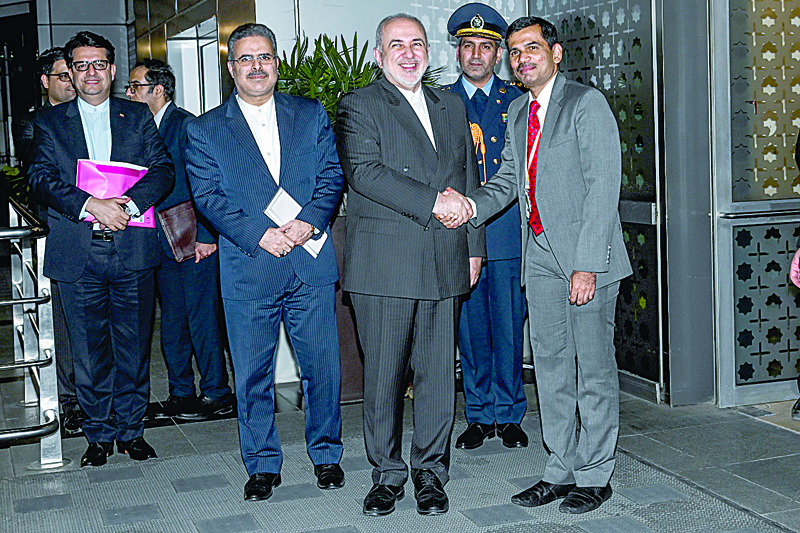
NEW DELHI: European powers have violated a 2015 international nuclear deal, Iran's foreign minister told a conference in India yesterday, a day after Britain, France and Germany launched a complaint against Tehran for non-compliance. The European states initiated a so-called dispute mechanism process, saying Iran had progressively scaled back its commitments under the agreement.
The move, which came at a time of red-hot tensions between Iran and the United States, sparked anger in Tehran and on Wednesday Iran's foreign minister Javad Zarif said Europe was being "bullied" by Washington. "They are not buying oil from us, all of their companies have withdrawn from Iran. So Europe is in violation," Zarif told a conference in New Delhi, saying the future of the deal now "depends on Europe".
He added that the European Union "is the largest global economy. So why do you allow the United States to bully you around?" The accord, which makes it significantly more difficult for Iran to develop nuclear weapons undetected, was struck in Vienna by Iran, the three European nations, the United States, China and Russia.
The agreement allows a party to claim significant non-compliance by another party before a joint commission. If the issue is not resolved by the commission, it then goes to an advisory board and eventually to the UN Security Council, which could reimpose sanctions that were lifted under the accord. President Donald Trump withdrew the United States from the deal in 2018. Since then Iran has walked back on its commitments including on processing uranium, which can be used in nuclear weapons.
Tehran's latest step in January to forgo the limit on the number of machines used to make uranium more potent prompted the Europeans to trigger the mechanism. But the three powers said they "once again express our commitment" to the deal and expressed "determination to work with all participants to preserve it." Iran's foreign ministry said in response on Tuesday that "if the Europeans… seek to abuse (this process), they must also be prepared to accept the consequences".
'Thoughtless'
Russia condemned the "thoughtless" European move, warning it risked causing a "new escalation". A US State Department spokesperson said Washington fully supported the three countries, adding "further diplomatic and economic pressure is warranted". Zarif also said that the US killing on January 3 of top Iranian general Qasem Soleimani in Iraq had served only to strengthen the Islamic State group.
"I think the war against Daesh (ISIS) just suffered a major setback, and Daesh just won a major victory," he said. He also implied that the crisis sparked by the killing of Soleimani had contributed to Iran's accidental shooting down of a Ukrainian airliner on January 8, killing all 176 people on board. "Why did it happen? Because there was a crisis. People make mistakes, unforgivable mistakes, but it happened in the time of the crisis," Zarif said.
Meanwhile, Russia's Foreign Minister Sergey Lavrov said yesterday Moscow has been urging Gulf countries to consider a common security mechanism for the region and it was time the world got rid of unilateral measures such as sanctions. "We have been suggesting to the Gulf countries to think about collective security mechanisms … starting with confidence building measures and inviting each other to military exercises," Lavrov told a security conference in Delhi. Tensions in the Gulf have risen following the US killing of Iranian military commander General Qassem Soleimani and a retaliatory missile attack by Iran on US forces in Iraq.
"Since I mentioned about Persian Gulf, we are very much concerned about what is going in there," Lavrov said. Iran's Foreign Minister Mohammad Javad Zarif is also attending the conference in Delhi that comes just a day after Britain, France and Germany formally accused Iran of violating the terms of its 2015 agreement to curb its nuclear program, which eventually could lead to the reimposing of UN sanctions.
"So the 21st century is the time when we must get rid of any methods of dealing in international relations which smack of colonial and neo-colonial times. And sanctions, unilaterally imposed sanctions, they are not going to work." After pulling out of the Iran deal, the United States slapped sanctions back on Iran and has gradually increased its "maximum pressure" campaign targeting the Islamic Republic's revenues from oil, mining and other industries.
British Prime Minister Boris Johnson called on Tuesday for US President Donald Trump to replace the Iranian nuclear deal with his own new pact to ensure the Islamic Republic does not get an atomic weapon. Trump said in a tweet he agreed with Johnson for a "Trump deal". US Deputy National Security Adviser Matthew Pottinger will also be addressing the Delhi meeting on Thursday.-Agencies










